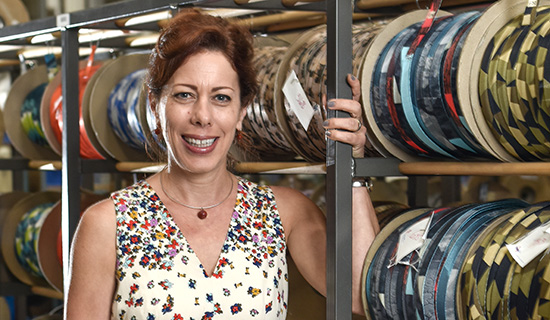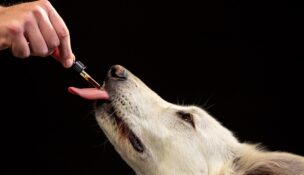Pet Age Women of Influence 2020 Winners
Pet Age Staff //March 11, 2020//
When the Women of Influence (WOI) award program was started in 2015, Pet Age honored 25 of the industry’s outstanding female leaders. The inaugural class included Huxley & Kent founder Robin Kershner, Ark Naturals founder Susan Weiss, and Lucy Postins, founder and CEO of The Honest Kitchen. Since then, Pet Age has recognized Tierra Bonaldi of The Impetus Agency, Carina Evans of Podium Pet Products, Susan Goldstein of Earth Animal, Ellen Lawson of Fluff & Tuff, Breann Shook of Grandma Lucy’s and Alice Tillett of Petmate, as well as many others.
Although they come from different sectors of the industry, the recipients always have several things in common. These women have made a notable impact on the field in which they work while also inspiring a new generation of women to join the pet industry. They are game changers and trailblazers who are making continual contributions to the pet care community and the pets that we all serve.
Among this year’s honorees, Austin and Kat founder Kat Donatello credits Sarah Blakley, founder and CEO of Spanx, as being a role model who motivated Donatello to chase her dreams.
“She’s a wife, a mother and an empire builder, but she also dedicates a lot of her time to philanthropy and empowering women to reach their potential,” Donatello explained. “As a mom of daughters myself, I can attest this sort of messaging us just so important for girls to hear.”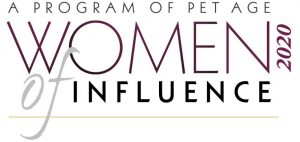
Since an early age, Ruth MacPete, a veterinary media correspondent and consultant, has followed the exploits of Leakey’s Angels—Jane Goodall, Dian Fossey and Birute Galdikas—who MacPete noted “set a moving example of how one person can make a huge difference.”
Meanwhile, Sissy McGill, founder of Solid Gold Pet, points to pets as the primary reason for her career in the pet industry.
“They love you unconditionally, and I want to be their voice,” McGill remarked. “We all want our pets to live a long, happy life. I am inspired, passionate and drive to do right by them each and every day!”
The 2020 WOI winners are ambitious, hardworking women who hold leadership positions throughout the sector with titles that include veterinarian, senior buyer, sales director and CEO. In the profiles that follow, this year’s WOI recipients share their success stories. Read on as they reveal to Pet Age their inspiration for entering the industry, what they consider to be their biggest contribution and also the current issues they believe need the attention from their colleagues for the betterment of companion animals.
Pet Age is proud to celebrate the incredible role models who comprise this year’s Women of Influence Awards.
2020 Lifetime Achievement Award: Kim Stout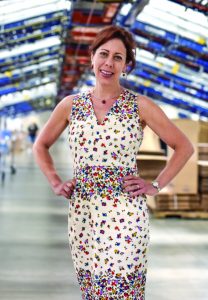
Coastal Pet Products boasts more than five decades of sales and manufacturing experience in the pet industry. The family-owned company employs nearly 500 people and offers more than 7,500 SKUs from a distribution facility that tops 375,000 square feet.
It’s vital to maintain strong relationships with customers and suppliers to maximize efficiency and evolve to meet their needs. In order to stay ahead of the competition, especially with today’s technological advancements and the challenge of creating a potent omni-channel strategy, a strong leader is required.
That’s where Kim Stout steps in as president of Coastal. Stout wasn’t even born when the company was created. She worked in marketing for Coastal while still in high school, before going off to college and starting a teaching career. She returned to Coastal in 2000 as a regional sales manager and has remained with the company ever since.
As president, she is directing Coastal’s retail strategy that’s aimed at not only ensuring Coastal’s products are available wherever pet owners shop, but also at ensuring consumers are aware of the Coastal brand name and what it represents.
Stout exemplifies who Pet Age’s Women of Influence Lifetime Achievement Award is meant for: someone who remains true to their values of working hard and who also enjoys doing what they love.
“I’ve been blessed to have a career in the pet care industry,” Stout said in response to being named this year’s Lifetime Achievement Award. “Coastal Pet Products was started by my father, Jim Stout, and his brother, Tom Stout, in 1968. Coming into our family business has been rewarding in so many ways. I appreciate all the wonderful people I’ve learned from over the years: Ken Chancey, Sandy Moore, Joe Markham, Maureen Costello and Patti Strand to name a few amongst so many passionate mentors. It takes a team to build a great company. Thank you to my family, our customers and associates and all the amazing pets that makes this the best job ever!”
Robin Bennett, CPDT-KA, The Dog Gurus
What inspired you to get into the pet industry?
My love of dogs and people as well as my desired to help people understand dogs better. I saw that there were many misunderstandings between the two species (dogs and people) and relationships could be stronger if people could better “read” dogs. I love helping people build a stronger relationship with the pets they love by teaching them about canine body language and seeing successful pet care businesses who can spread that information to pet parents.
What do you feel is your biggest contribution to the pet business and/or pet parents?
As an author and speaker, creating a comprehensive training program called Knowing Dogs that can teach pet care business staff members how to better care for the dogs. Knowing Dogs is a million+ dollar product recognized by three different organizations for CEUS (PACCC, RACE and CCPDT). This product grew from a desire to make sure dogs were provided proper care and understanding and remains the No. 1 training tool for the pet care industry on canine body language.
What issues do you think need more attention from the pet industry and why?
Regulation! I think independent third-party certification is vitally important to the well-being of pets in pet care facilities. Since the pet industry (boarding, day care and training) is completely unregulated, there are many facilities who put dogs at risk. I would love to see minimum standards of care implemented and required through independent, third-party certification.
Donna Foley Birnbaum, National Sales Manager, Penn-Plax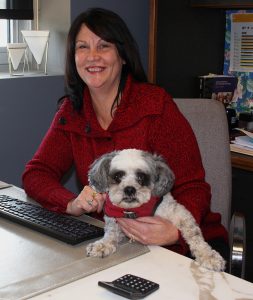
What inspired you to get into the pet industry?
I wanted to be in an industry that brought happiness to homes across the country. For nearly 25 years, research has shown that living with pets provides health benefits such as improving people’s moods by raising their dopamine and serotonin levels. In addition, pets have been shown to boost our immunity. But even without the science, people understand the simple fact: They are happier when they have a pet. I got to experience the physical and emotional benefits of pet ownership firsthand eight years ago when I adopted my dog Patches at the Global Trade Show from Florida Little Dog Rescue. Patches brings priceless joy to our family each day with her warm welcome and her boundless affection. No matter how stressful or busy our days might be, we know that Patches is waiting at home to greet us with enthusiasm. From a business standpoint, our industry is basically recession-proof.
What do you feel is your biggest contribution to the pet business and/or pet parents?
My enthusiasm for meeting the needs of my customers is fueled by my motivation to do my job in the right way. I’ve established long and productive relationships with my clients because they know that I will find a way around any obstacle that presents itself. I take pride in the contribution I have made to the growth and expansion of my customers. Over the years, I have honored and nurtured my relationships with the many quality sales representatives I have worked with. Recognizing and embracing their unique creative selling styles has contributed greatly to my company’s overall growth. Last but not least, I have promoted products in a way that ensured that innovative Penn-Plax merchandise has a presence throughout the market.
What issues do you think need more attention from the pet industry and why?
Millennial and Generation Z consumers have embraced the pet-owning and pet-loving lifestyles to a far greater extent than their elders. While baby boomers account for 32 percent of pets owned, younger households account for 62 percent of pet ownership. This presents the industry with a great opportunity for growth. If we are able to utilize traditional ways of distributing our products while also embracing new models of delivering to our customers, we should be on the cusp of a broad expansion for pet products. We need to prepare for this growth by developing innovative and appealing methods to respond to the demand.
Judy Breton, Director of Grooming (now retired), World Pet Association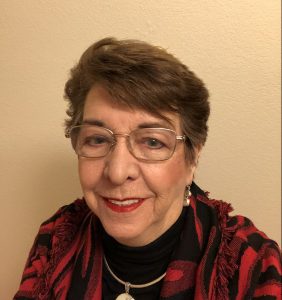
What inspired you to get into the pet industry?
My family are owners of Breton’s School for Dogs, a commercial dog and cat-boarding kennel, training and grooming facility in Danville, California. My father and sister were both dog trainers. I started grooming to round out the family business offerings.
What do you feel is your biggest contribution to the pet business and/or pet parents?
Actively working to bring professionalism to the grooming industry by building groomers acceptance through programs at SuperZoo and other national and international shows. Bringing the world grooming community together by offering prestigious competitions in the United States.
Also, working with PIJAC and National Grooming Associations and schools to launch the Professional Pet Groomers & Stylist Alliance and to publish the Grooming Industry Standards of Care, Safely and Sanitation.
I was also very fortunate to have been able to work with Tomlyn Products as key accounts manager, working with PetSmart and Petco in their grooming services sector.
What issues do you think need more attention from the pet industry and why?
Basic proper health, handling and care of pets. Educating the general public on the grooming needs of their pets and understanding what the groomers do to keep their pets safe. Continuing education for grooming stylists to communicate with their customers to promote safety for their pets and the groomer.
Collette Bunton, Chief Executive Officer, Whistle Lab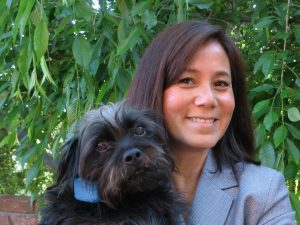
What inspired you to get into the pet industry?
Throughout my upbringing, I have always had a pet. I was two weeks old when we got my first dog, Licorice—we grew up together. I currently have two dogs who play pivotal roles in my family’s life. Pets have always made our world happier and more fulfilled, and I am proud to use my skills to make pets lives better and give back to them.
What do you feel is your biggest contribution to the pet business and/or pet parents?
Given my unique background coming from tech- and ecosystem-focused companies (not pet, vet or CPG), I’m able to use my outsider’s perspective to see how technology can be applied in real life to give pet parents actionable insights that their pet can’t share and, in turn, arm them with information and services to help proactively care for their fur baby. Pet parenting can be confusing and frustrating, but Whistle aims to make raising pets easier for the pet parent, resulting in a better life for your pet.
What issues do you think need more attention from the pet industry and why?
Our goal is to keep pets from being returned to shelters. It is all about the relational aspect: whether that be making it easier to spot health-related issues, finding a comfortable place to play or having lunch out with your dog. Whistle strives to minimize the confusion and misinterpretation between pets and their parents so we can have the relationship we want with our pets.
Susan Calles, National Marketing Manager, Ethical Products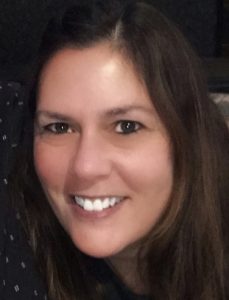
What inspired you to get into the pet industry?
I have been passionate about pets and animals since I was a young child. I grew up always having dogs and cats in our home. I would even adopt outside animals as my own by building homes for lizards I would catch in the yard. As an adult, my home has always been filled with the love of dogs. At any given time, I’ve had four to six dogs—rescues and purebreds! When I moved east and left the financial industry, I came across Ethical Products’ need for a marketing coordinator, met with the Zelinger family and here I am 23 years later! I am fortunate to be able to combine my love for animals with my career of creating products and marketing programs that benefits retailers and pets worldwide.
What do you feel is your biggest contribution to the pet business and/or pet parents?
I am very proud to manage the creativity that goes into designing products, packaging and the displays for Ethical Products’ line of pet toys and accessories. At Ethical Products, our focus is to bring relevant messaging to retailers and their consumers in a fun yet informative way. Given the human-animal bond that exists today, providing pet parents with the information they need to make informed decisions on what to buy for their furry friends is very important to me. I take the love of my own pets and use it to guide me in the right direction to enhance the lives of pets and pet parents.
What issues do you think need more attention from the pet industry and why?
Our industry is changing rapidly, and I believe we need to support the independent retailers through education and communication. Helping retailers achieve their goals while up against online retailers by providing them with as much knowledge on all products they offer to consumers will give them the upper hand. Strengthening the retailer-consumer bond is just as important as the human-animal bond. Creating an environment where pet parents can trust their retailers and consider them a reliable source of information for their furry family members is paramount.
Lucy Caprez, Marketing Director, Natural Cravings/Barking Buddha Pet Products
What inspired you to get into the pet industry?
I was asked by my husband to join his company to handle all of their marketing and branding. After joining him, the first thing that I noticed myself was the kindness of the people in the industry. Coming from the food industry, the first thing I noticed was how in the pet world everyone is kind and kookie, and most people are driven by the love of their pets. I have been able to see firsthand people helping other people without an agenda or looking to help themselves as well. It is an industry of kindness more than anything.
What do you feel is your biggest contribution to the pet business and/or pet parents?
I believe it has been about breaking the mold in how we brand Natural Cravings and Barking Buddha. We have been asked to “tone it down” with the fun and make it look more scientific like other brands do—and honestly, we truly believe that you can offer top-quality products and still deliver our message with a lot of positivity and light. As a family-owned business, we have been able to set the tone of our message, making pet owners happy and making them smile with our logos, packaging and branding as well as how we engage online and in social media.
What issues do you think need more attention from the pet industry and why?
Pet adoption and overpopulation would be one of my top issues. We need to educate the public more and more about spaying and neutering our pets to prevent overpopulation of innocent animals that will either end up in a shelter or simply homeless. Accidents happen and sometimes pets get lost, and we can prevent a litter by sterilizing our pets. The solution to the problem of overpopulation is so simple that with the proper campaigns and combined efforts, I know we can make a big difference on how many reluctant pet owners could see the sterilization of their pet as a form of prevention of other animals that will end up suffering without a proper home and care.
Carrie Cissell, Sr. Buying Manager, Walmart Inc.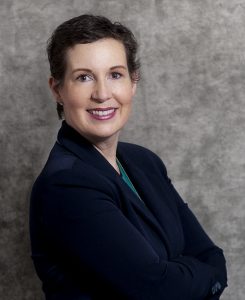
What inspired you to get into the pet industry?
I was intrigued by the passion our customers have for their pets. Pets have become a big part of our everyday lives and part of our families. They provide companionship and often emotional support.
What do you feel is your biggest contribution to the pet business and/or pet parents?
I’m committed to taking care of our customers’ needs and delivering on their quality expectations at a value. I enjoy partnering with our suppliers to address the pain points of owning a cat and making our customers lives easier.
What issues do you think need more attention from the pet industry and why?
Pet shelters across the country are overcrowded, and the number of homeless pets are on the rise. We need more education regarding responsible pet ownership. Litter box aversion is one of the main reasons cats end up at a shelter, and I would really like to see the industry do more to address this opportunity.
Kelly Costello, CEO, Puppy Cake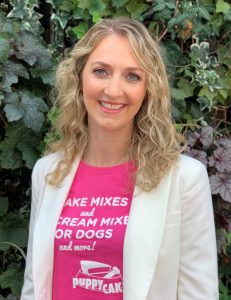
What inspired you to get into the pet industry?
In 2007, I was looking at old cake mix advertisements for a client. I thought, “Wouldn’t it be great if they made that for dogs?” It was that moment that I realized that dog owners across the globe wanted to treat their dogs like family by giving them safe and healthy cakes.
What do you feel is your biggest contribution to the pet business and/or pet parents?
I have a passion for helping new entrepreneurs grow their business. Over the years, I have helped other companies with advice, resources and mentoring.
What issues do you think need more attention from the pet industry and why?
I really feel strongly that we have a serious pet overpopulation problem that could be helped with better education. Before I got into rescuing, I thought I was a well-versed and educated pet owner. The statistic that 50 percent of dogs that get into shelters are euthanized rocked me to my core. This issue can be relieved by educating all dog owners to spay/neuter their pets, consider rescue or buying from responsible breeders only.
Peta Cutts, Senior Director, R&D Quality & Food Safety, Mars Petcare North America
What inspired you to get into the pet industry?
I have always loved animals and have had pets my whole life. I originally considered a career as a veterinarian, but when I started university, I found my way to food science. Mars, and specifically the Petcare segment, offered a great way to combine my two passions.
What do you feel is your biggest contribution to the pet business and/or pet parents?
In my role, I help to make sure that pets and pet parents have access to nutritious, safe, high-quality pet food. As a pet parent myself, I know how important it is to trust the food you’re providing your four-legged family members. Being part of a company that is so focused on our quality standards is a point of pride for me.
What issues do you think need more attention from the pet industry and why?
Pets play a really important role in our families. As pet parents, we often don’t have access to resources or amenities that make it easy to spend time with our pets outside of our homes. As an industry, I’d love for us to champion the benefits of pets and help make sure communities everywhere are promoting responsible pet ownership, while also making it easy for pets and people to spend quality time together.
Johnna Deverauex, Owner, Fetch RI
What inspired you to get into the pet industry?
My love for animals has run deep since I was a little girl—it was this love combined with an adorable rescue puppy I took home from the shelter that changed the trajectory of my life. My rescue, Diego, was getting the best he could get—and yet his body still showed signs of sickness. Diego is the reason I began to dig deeper into nutrition, became a clinical pet nutritionist and combined my knowledge of herbs, nutrition and my love of pets into a career that I’m proud of.
What do you feel is your biggest contribution to the pet business and/or pet parents?
It’s rewarding to educate pet parents about canine and feline nutrition, teach them how those bodies are designed and help them understand that their pet is an individual with unique needs. I have helped countless pet owners’ help their pets reach a whole new level of health. That makes me feel good about what I do and feel this is my best contribution.
What issues do you think need more attention from the pet industry and why?
There are many issues that need more attention from the pet industry as a whole, but I feel the most important is providing transparency to pet parents about ingredients—and the quality of the ingredients—that they are purchasing. Pet parents should be able to make decisions based on fact, not marketing hype, about the things they put into their pet’s bodies.
Kat Donatello, Founder and CEO, Austin and Kat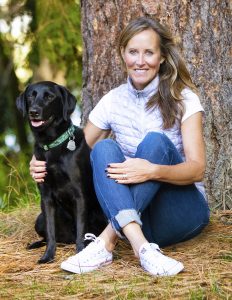
What inspired you to get into the pet industry?
I started this company in the fall of 2014, in my home kitchen in Maine. I had nothing but a simple desire to bake up some wholesome treats for my beloved aging dog, Brady—he was getting older, creakier and losing his lighthearted outlook. I also wanted to help my young lab, Austin, with his borderline frenetic hyperactivity.
Because of my many years in endurance sports, I’ve always been interested in holistic and natural solutions to our own problems, and I liked keeping tabs on new and groundbreaking research. I’d been hearing lots about this naturally occurring component of hemp called cannabidiol (CBD). After many late nights on my laptop, Q&A sessions with my vet, and lots of trial and error, I was finally able to bake up a biscuit delicious enough to dole out to my pets. And I noticed improvement right away. It was an overwhelmingly positive difference, in my pets’ pain and behavior (among other things), and I knew I was on to something.
I started sharing my treats with my friends and word began to spread. Literally, I became known as the “treat lady” in my small town overnight. When I couldn’t walk down the street before people began to ask me where they could get some CBD biscuits for their own dogs, it was time to take a leap of faith and begin a business.
What do you feel is your biggest contribution to the pet business and/or pet parents?
The customer satisfaction and appreciation they have for my products is what fuels me. I never really stopped to consider the degree to which these products would actually impact families and their pets, but as a dog owner myself, I empathize with the magnitude of care and concern owners have for their furry friends. It became very apparent very quickly that when pets are struggling, so are their owners!
When I started Austin and Kat, my sole mission was to help pets who were suffering. What I never expected was just how much the families were impacted, too, when their pet found relief, comfort, health and happiness using my products. It’s so fulfilling to receive these stories and updates from owners, and it really inspires me to continue to make products that work, with both purpose and intention.
What issues do you think need more attention from the pet industry and why?
With the influx of new products and companies, there is a lot of noise to sift through, making it difficult for targeted consumers to decipher the credibility of the products being marketed to them. I am campaigning to change that by encouraging my customers to demand clarity when it comes to the products they’re purchasing.
As a member of the NASC (National Animal Supplement Council), we are part of a proud coalition of brands that are fully committed to animal safety and wellness. I have been provided with adequate guidance in meeting industry standards and recommendations, but there’s still a lot of ambiguity surrounding where the true regulation of pet treats and supplements will fall. Should it be under the guidance of the FDA, USDA, AAFCO or the individual states in which the products are sold? Ideally, the pet industry needs to be governed by those who know it best to provide standards and regulations, which can then adapt to trends and ultimately improve the quality, transparency and efficacy of all pet consumables.
From knowing the product’s manufacturers, ingredient sourcing, distributor relationships and industry regulations, the consumer should be able to make an informed decision and thoroughly know what they’re giving their pets. We have to be the best advocates for our pets, simply because they can’t do it for themselves.
Sherry Huber, Co-Founder and COO, Treat Planet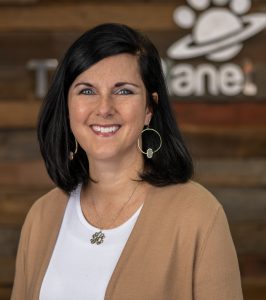
What inspired you to get into the pet industry?
Seeking an opportunity to own a company, my business partner, Doug Martin, and I looked to find an industry where we could impact lives with the products we produced and allow us to use our diverse business skills to bring a unique approach to the customer-vendor relationship. We knew right away that the pet industry would allow us to achieve these goals. Every day, I am inspired by the people and the passion in this industry. It ranges from the pet parents to the retailers to the distributors to the vendors and manufacturers, all sharing a common goal of ensuring we are creating the best products possible to enrich and extend the lives of the pets that are part of our families and mean so much to our health and well-being.
What do you feel is your biggest contribution to the pet business and/or pet parents?
Avoiding complacency and continually innovating is something we pride ourselves on at Treat Planet. While we have enjoyed a CAGR of over 60 percent each year in business, we have never lost sight of what is important inside and outside of our walls. We are successful because of the people we surround ourselves with. We believe in forming relationships with our customers and suppliers that is beyond just a buy/sell relationship. We cherish the connections we have with fellow colleagues. We are strong believers in community and giving back, and that is why we are so proud of our work with Goodwill Industries, Project Inc. and HABRI. Our staff makes our success possible. We never want to be too big or too important to keep these personal connections. These relationships are what have allowed us to achieve the success we have and keep us focused on always improving.
What issues do you think need more attention from the pet industry and why?
The regulatory system needs more consistency and a single body governance. Today, each state interprets the AAFCO rules and regulations and applies their own discernments, which regularly vary widely from one state to another. These inconsistencies create confusion and cost all of us time and money in avoidable packaging changes. Regulatory is necessary, but having 50 levels of approval for every new product you want to launch is disproportionate to the process.
Angela Hughes, Veterinary Geneticist and Science Advocate, Mars Petcare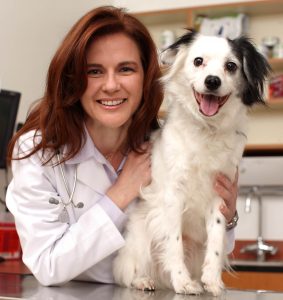
What inspired you to get into the pet industry?
I grew up with dogs, cats and fish at home and learned to ride horses starting at age six. During college, I taught horseback riding at the Girl Scout camp where I learned and had an epiphany while treating an injured horse: I wanted to be a veterinarian! I changed my major and ended up studying genetics. This led me to veterinary school, followed by a residency and Ph.D. in genetics. I’ve enjoyed sharing my love of animals and genetics with thousands of clients and veterinarians.
What do you feel is your biggest contribution to the pet business and/or pet parents?
Being part of a nascent corner of the industry, I helped shape the field of genetic diagnostics to better understand what makes pets tick. My biggest contribution has been as a teacher, helping people understand the science and use this great new technology to provide better care based on the individual needs of their pet.
What issues do you think need more attention from the pet industry and why?
The industry is moving quickly as new technologies and diagnostic capabilities are becoming available, and it can be difficult to communicate these changes. If we can educate the public, this will create the opportunity for even greater individualized care in the hospital and at home.
Wenchi Lin, President, New Age Pet
What inspired you to get into the pet industry?
When I decided to leave the corporate finance world to pursuit a more balanced career life in the private sector, I visited many consumer product trade shows, looking for opportunities to utilize my manufacturing resource in China. I was most impressed by the people at the pet industry shows. The exhibitors were so eager to talk to any visitors their products, with great passion and pride. I felt been drawn into this world of loving, passionate, open and welcoming crowd. Being an animal lover at early age, it wasn’t a hard decision to start my new career in the pet industry.
What do you feel is your biggest contribution to the pet business and/or pet parents?
After providing OEM service to other pet product companies for a couple of years, I teamed up with my manufacturer to start develop our own pet product line, New Age Pet. New Age Pet is the first and only pet habitat line originated and designed truly with the pet’s health and pet owner in mind. New Age Pet products, whether it’s indoor pet furniture or outdoor pet shelters, are all made from ECOFLEX, our proprietary composite material that’s not only environmental friendly, its durability, non-toxic, non-absorbent and easy to clean property provides the most healthy habitats to the pets and the best value to the pet owners they deserve. I believe it’s important to provide products that are safe for pets, I won’t trade their health for low-cost material or sub-par structural design. That’s why we back this belief up with our product warranty, because at the end of the day we want to make sure pet owners love our products as much as their pets do. The New Age Pet brand gives the pet industry a high quantity, animal friendly habitat line to offer to the consumers.
What issues do you think need more attention from the pet industry and why?
I would like to see the industry implement regulatory compliance on pet habitat product’s quality, especially from pet safety and pet health standard.
Christy Love, President and CEO, Super Snouts Hemp Co.
What inspired you to get into the pet industry?
It was definitely my deep love of dogs and creating products to enhance their lives. Being an entrepreneur at my core, I felt a deep calling to bring innovative, smart and honest products to a market and customers I am passionate about.
What do you feel is your biggest contribution to the pet business and/or pet parents?
Innovation and transparency. As a company, we feel deeply grateful and accountable to our customers and their pets. We feel it is our responsibility to push the industry forward by using the best factual science and technology in the products we offer.
What issues do you think need more attention from the pet industry and why?
Education. Customers crave information. As a company, we regularly consult with top hemp farmers, seed geneticists, scientists and veterinarians to make sure that we have correct information backed by real science when formulating or selling a product into the market. We strive to lift our customers up with clear education in a category that can be very confusing.
Ruth MacPete, DVM, MacPete Veterinary Service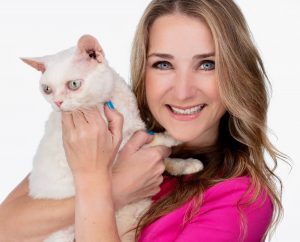
What inspired you to get into the pet industry?
For as long as I can remember, I always knew that I wanted to be a veterinarian. I grew up in a household that included dogs, cats, rodents, birds, fish, chinchillas, and even a duck. As a young child, I recall roaming the neighborhood to find and nurse injured and abandoned animals back to health. As I got older, I volunteered at local animal shelters and veterinary clinics. Animals have always been an important part of my life, but these experiences galvanized my desire to become a veterinarian and motivated me to dedicate my life to helping animals.
What do you feel is your biggest contribution to the pet business and/or pet parents?
I am most proud of my contributions as a media correspondent and writer. Educating pet parents about how to care for their animals is a large part of veterinary medicine. While working at a local shelter years ago, I realized that many of the animals ended up in the shelter because the general public was unaware of the value of microchips or the importance of spaying and neutering. Motivated to educate more pet parents, I began writing for various magazines, such as Cat Fancy, Bark, Kittens USA and Pet Business, and started doing pet segments for a local NBC affiliate about pets and veterinary care. I realized that television and writing gave me the platforms to address important pet health issues and to help animals on a larger scale. I recently wrote a children’s book called “Lisette the Vet,” about a little girl who loves animals and wants to be a veterinarian, in the hopes of inspiring more children to become veterinarians.
What issues do you think need more attention from the pet industry and why?
As a practicing veterinarian and pet parent, I have experienced firsthand the problem of rapidly rising pet expenses. Pet expenses, especially veterinary expenses, are becoming unaffordable for many pet parents. Without pet insurance, many pet parents have to choose between deferring treatment for their beloved animals or using credit cards to finance the high cost of veterinary care. Becoming a pet parent has always been a large responsibility. In light of the rising costs of pet expenses, prospective pet parents need to anticipate the financial responsibilities of being pet parent. I would love to see more educational campaigns for pet parents about the importance of pet insurance.
Molly McAllister, DVM, MPH, Chief Medical Officer, Banfield Pet Hospital
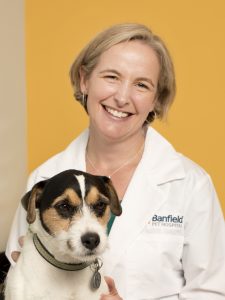
What inspired you to get into the pet industry?
I have loved pets deeply for as long as I can remember and feel fortunate that I grew up on a family farm. Because of that, pets were a natural part of life and I was able to experience the joy and learning of raising and caring for animals of all types. Dogs and cats for certain, but also chickens, rabbits, horses, cows, sheep and more. The joy that my pets brought to me inspired me to go into a career in which I could return that favor, but also so that I could help other people experience the joy and love that pets bring to them. There was never any doubt in my mind that I would work in a job with animals, but it wasn’t until my college years when an interest in science and medicine was really sparked and led me to entering veterinary school.
What do you feel is your biggest contribution to the pet business and/or pet parents?
I believe my greatest contribution is paving the way to show people, particularly women, that you can be a leader and influence the future of the pet profession while still taking care of yourself. More specifically, the biggest contribution that pets can bring to our lives is to promote our well-being. However, veterinary professionals and other care providers frequently land in situations where they sacrifice their own well-being in a desire to do the work they are so passionate about or because they think they have no choice, because they haven’t seen a model of how to engage in the work successfully and sustainably. In my work at Banfield, I have been a driver of the efforts to support health and well-being for our own associates. I have also worked with various organizations, including the AVMA and NAVC to promote health and well-being among our profession. Finally, I feel that one of my top priorities is to consistently model what it is to take care of yourself – to make sure you put your own oxygen mask on first, you could say – so that we are, in turn, able to give our best to the pets and the people who depend on us each day.
What issues do you think need more attention from the pet industry and why?
The pet industry has been the lucky recipient of a paradigm shift where pets have moved from our barnyards to our bedrooms. Given that shift in relationship with pets now considered part of the family, it is crucial that those of us in the pet industry work earnestly to ensure our businesses understand and support the human animal bond as it evolves. This means that we need to be prepared to have conversations with people about their pets in new ways. We need to be open to new ideas for how to care for pets, and we need to challenge the status quo for how pets are cared for and how pet parents are supported. From the standpoint of the veterinary profession, this means looking at how we provide care and the assumptions that we make around that process and challenging those assumptions to find ways we can do better. How can we support pet parents in feeling as if their experience in our clinics rivals that of the best pediatrician and that we treat each and every pet as an individual with their own set of needs? How can we remove any traces of paternalistic health care provision where we “know best,” and instead become trusted partners in promoting the nest quality of life for each pet, as perceived by their parent. This is a challenge and a very exciting time, because we can really create something personalized that improves society by taking far better care of pets and the people who love them.
Sissy McGill, Founder, Solid Gold Pet
What inspired you to get into the pet industry?
After my husband and I divorced after 15 years of marriage, I decided to change my life. I raised Great Danes and found out that American Great Danes lived to be 7-9 years while the German Danes lived to be 13-14 years. Why? It had to be the dog food. I was unhappy with the choice of dog foods on the market. The dog food in Germany was superior to anything we had in the United States at the time—all-natural, no chemicals, no fillers. I knew we needed something like this in the U.S., so I did my research and started Solid Gold.
What do you feel is your biggest contribution to the pet business and/or pet parents?
I introduced the first natural dog food in the U.S., Hund-N-Flocken, around 1973. At that time, there was no natural dog food in the U.S. I looked into all food options. When I’d get a sample bag of food from a dog show, I’d look at the ingredients and research what they meant. Some I liked and some I didn’t like. For four years, I worked out of the floor of my living room and out of my garage creating the first holistic recipe, Hund-N-Flocken, and handing out samples. Gut health is important because the immune system supports the whole body. If you’re not healthy in the stomach, you’re not healthy any place else in the body. That controls everything. Pets needed a natural pet food option in the U.S. It was tough getting there. I never thought of myself as a trailblazer. It’s just something that had to be done.
What issues do you think need more attention from the pet industry and why?
We need to advocate for pets. We need to educate pet parents on what to look for in a pet food and what benefits certain ingredients can bring. The nutritional landscape is constantly changing, and I read about it every day to make sure I can stay up to date on the latest information. We do the same for human food, so why not for pet food?
Jill Nazimek, President, Katie’s Pet Products
What inspired you to get into the pet industry?
My mother told me how her Landseer Newfoundland (Newfie) Katie needed a toy that she could see in the water during water training. And it needed to be striped or checked. I said, “I can make that!” I had no idea what I was doing, but I found someone to make a toy for me. It was perfect for the newfies, and a few local stores wanted to buy some. And suddenly I was in business! I have always wanted to have my own business. I worked for small startups for years. Right after 9/11, I was looking for a new job. But like most people, I was looking for answers. Katie’s Bumpers was born. And that was the beginning!
What do you feel is your biggest contribution to the pet business and/or pet parents?
We invented the fire hose dog toy category in 2002. We grew Katie’s Bumpers to over 3,000 stores and multiple distributors nationally and worldwide in 10 years. In 2012, we licensed Katie’s Bumpers to Kong and Gralen. We had been selling small batch holistic supplements from businesses who make incredibly effective and unique products. We took that business, expanded it and created Katie’s Pet Products Distributors of fine holistic supplements. We now have over 1,000 stores and veterinarians who buy from us and trust us to provide excellent products.
What issues do you think need more attention from the pet industry and why?
There is not enough industry support for micro independent and small stores. When there are big issues that affect all of the stores that we work with, like the DCM issue, all store owners end up doing all of the research on their own. They need to create a story to help their customers understand the problem and how to move forward with a good solution. The small independent stores need guidance from our industry. The problem is that when there is a huge hiccup, store owners are on their own. Having guidance and help from APPA and WPA is very important. I would love to see small/micro independent divisions in both APPA and WPA. Another great idea would be to have a mentoring program. This would be amazing. There are new stores opening all of the time. Each of those new store owners are “drinking from a fire hose” and having to figure everything out on their own. If there was a mentoring program, it would help small business owners get started much faster.
Kris Parrottino, Owner, Healthy Dog Chews
What inspired you to get into the pet industry?
I left my career in the hospitality industry to pursue starting my own business in an industry that had meaning to me. My interest in getting into the pet industry came from the love that I have for our pets. We were searching for products that were of the highest quality. The products we were looking for need to be 100 percent all-natural, chemical-free, contained no antibiotics and were from free ranging livestock. Having difficulties finding high-quality products in our local pet store led me to researching how products were processed and their origin. This is how we started Healthy Dog Chews.
What do you feel is your biggest contribution to the pet business and/or pet parents?
Besides providing high-quality products, we wanted to provide flexibility to independent pet store owners. Healthy Dog Chews achieved this by offering no minimum orders, selling by the unit as well as by the case, 100 percent satisfaction guarantee and same day shipping. We created a unique opportunity to provide these high-quality products to retail stores at low prices to increase their profit margin. Healthy Dog Chews also provides outstanding customer service. We have customer service representatives that answer questions and concerns by either a phone call or email immediately!
What issues do you think need more attention from the pet industry and why?
I think the pet industry needs be more transparent on the country of origin of products and how and where they are processed. Pet owners are more aware than ever of shortcuts certain countries take.
Anne Rotberg, Director, Attendee Services, American Pet Products Association
What inspired you to get into the pet industry?
My entry into the pet industry was serendipity. My previous professional experience was in sports marketing/licensing and retail partnerships. I took some time off to raise my two children, but as I was thinking about returning to the workforce, my friend, Bill Schoolman, who had just become president of APPMA, asked if I’d be available to work part-time. He was excited about the opportunity to take APPMA and their annual trade show to the next level. Staff was limited and needed support, so it seemed like an interesting opportunity. That was back in the late 1990s. A lot has happened since that initial introduction to the industry. My niche became buyer qualification and registration, and it expanded from there. My family acquired a wonderful Wheaten Terrier, Berni, and he made my connection to the industry even more relevant.
What do you feel is your biggest contribution to the pet business and/or pet parents?
My contribution to the pet business has been as part of the team that produces Global Pet Expo. Manufacturers exhibit and invest in the show to connect with professional buyers. We are proud of the caliber of buyers who attend to find new products, connect with manufacturers, network with industry professionals and take advantage of the superlative free education designed to help grow their business. Being involved with communicating these values and helping to grow attendance, have been among my proudest accomplishments. Sure, there are challenges, but I enjoy having conversations about the opportunities. There are so many great people in this industry and listening to them has helped me design programs to support them.
What issues do you think need more attention from the pet industry and why?
It is important to celebrate how all kinds of pets enhance life on this planet. Have a pet? Love a pet! Share stories about your pet. Respect your pet! Play with your pet. Help your pet to be a lovable member of your family. Take responsibility for their health and well-being. It is this connection with pets and the promotion of responsible pet ownership that drives the pet industry at its core. Let’s all take care of pets not just because it’s good business, but also because they make the world a better place.
Patti Salladay, Marketing and Sales, Northwest Naturals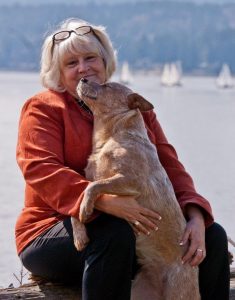
What inspired you to get into the pet industry?
Approximately 40+ years ago, I started as a groomer and breeder of Australian Cattle Dogs. I’ve always been striving to improve health and fitness of not only my dogs but my client dogs. I have been blessed and honored for these years to be able to love and enjoy not only my passion, my hobby and integrate it all with my work. I love my life.
What do you feel is your biggest contribution to the pet business and/or pet parents?
Education. Along with my passions, education and helping people learn about the importance of healthy feeding, the importance of incorporating fitness and enhancing their pet’s mental health. I have helped pioneer and lead the way in the raw food industry turning a trend into a category.
What issues do you think need more attention from the pet industry and why?
There are so many facets of the pet industry, I can only speak on the segment I am involved in. I would like to see more consistent governing of regulatory requirements for manufacturing, packaging and labels. We have different regulatory bodies governing and inspecting our pet food manufacturers, all with different guidelines and expectations and varies on consistency and regularity. Currently packaging requirements will vary from state to state and change year to year, [and] that adds increased unnecessary price increases and confusion among consumers. Being proactive in manufacturing practices, food safety and quality of ingredients should be the first priority to insure healthier pets and satisfied consumers. Packaging and labeling should be honest and transparent if the company has the certification to back up claims.
Elizabeth Stevens, Director of Sales & Marketing, WholesalePet.com
What inspired you to get into the pet industry?
My dog of course! I was a passionate pet parent to my Basset Hound, Forrest, when I went to work for a pet products company in Richmond. I just fell in love with the industry—at its core, it is an industry based in love and joy. Plus, there are office dogs! What could be better than that?
What do you feel is your biggest contribution to the pet business and/or pet parents?
Every day I am blown away by the innovation and bravery of so many people who follow their passion and develop a new product or open a store. To build these connections and grow the pet industry ecosystem is an honor, and it’s something everyone at WholesalePet takes great pride in. We love bringing people together.
What issues do you think need more attention from the pet industry and why?
Small businesses are the backbone of our economy. Industry consolidation and direct-to-consumer e-commerce has made it harder for small retailers and vendors to grow. We have all witnessed [the] independent channel help a pet brand grow, and then see the manufacturer cannibalize it in other channels. The big issue is for companies to set up all channels for success (including local brick and mortar), with MAP policies and well-thought-out channel strategies. A race to the bottom hurts everyone.
Annette Uda, President and Founder, PetAirapy
What inspired you to get into the pet industry?
I was inspired over 10 years ago to found PetAirapy as I searched for a healthy solution for my Shih Tzu, Tasha, who suffered for years from environmental allergies that left her uncomfortable with sores, ear infections, loss of hair and more. Her allergies became so severe that we were at the veterinarian’s office at least five times a year trying to get her symptoms under control and to help make her comfortable. Tasha was given steroids, medicated shampoos, antibiotics, etc. After several attempts to find out what she was allergic to, I was told it was pet atopy or environmental allergies. I asked our veterinarian if there was anything I could do to prevent Tasha from getting sick. The only thing the veterinarian could advise was, “If you can control the source of the environmental allergies, you can control the problem.” With that as my inspiration, I set out to find a solution. The more information I found about indoor environments and the health issues they pose to our animals, the more determined I was to figure out a way to make animal care environments as healthy as possible. Today, my company’s products and proprietary methods have been the subject of groundbreaking university and field studies, and I work with infectious disease experts and veterinarians to achieve up to a 99.9 percent kill rate of existing new, and emerging infectious animal diseases by sanitizing the air. She was a little dog who’s helped make a big difference.
What do you feel is your biggest contribution to the pet business and/or pet parents?
Through ongoing education, and thanks to those who’ve given me the opportunity to provide that education, we’ve moved the subject of infection control with ultraviolet germicidal irradiation (UVGI) out of the shadows and into the pet care industry mainstream. We still have a long way to go, but progress is being made. Using UVGI to control infection in human health care settings has become a standard protocol over the past century—hospitals use it, government buildings use it. But the pet care industry, where there are even fewer barriers to infectious disease transmission (imagine trying to put medical masks on animals and keeping them on), has been slower to make UVGI sanitizing part of a comprehensive infection control protocol. Over the past several years, I’ve had the opportunity to speak at many pet care conferences, give educational webinars and write articles for publications, dedicated to the pet business and to pet parents, on infection control and the importance of sanitizing with UVGI. Further, I’ve had the opportunity to educate on using the right UVGI, as not all UVGI is the same.
What issues do you think need more attention from the pet industry and why?
Education and recognizing the importance of education in all aspects of the pet industry. It’s why you’ll find me speaking at conferences, presenting webinars and writing articles. I love working in this industry, and I want it to be the best it can be. Education raises the level of professionalism, and it keeps pets safer and healthier.
